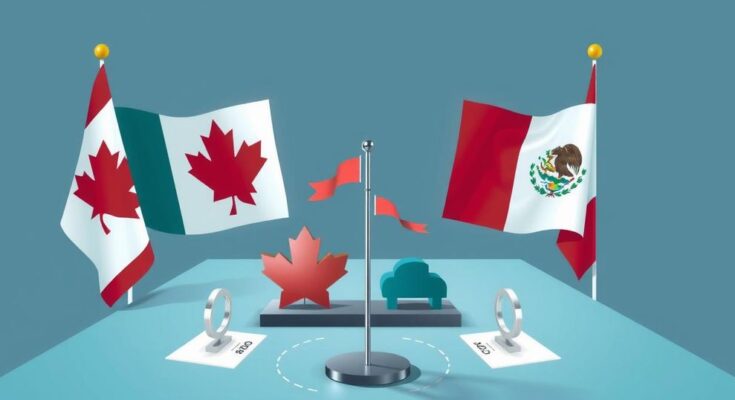President Trump’s April 2 announcement of reciprocal tariffs notably exempted Canada and Mexico, allowing them to avoid new tariffs despite ongoing trade duties. Existing tariffs on these nations remain in place, affecting specific products. Canada aims to respond with countermeasures while broader tariff rates apply to multiple nations, including China.
On April 2, President Donald Trump announced a series of reciprocal tariffs, expressing concerns that the United States has been “looted, pillaged, raped, plundered” by other nations. However, Canada and Mexico were notably exempt from these new tariffs, thus alleviating some economic tension between these nations and the United States.
Despite their exemption from the new tariffs, Canada and Mexico still face existing trade tariffs. Specifically, 25 percent current tariffs on imports from these countries remain active, including a 10 percent tariff on Canadian energy and potash products, as well as forthcoming levies on certain automotive products.
The US-Mexico-Canada Agreement (USMCA) enables trade provisions that exclude Canadian and Mexican goods from the April 2 tariffs. However, if these nations do not negotiate existing tariffs, they could still confront Trump’s latest baseline rate for future tariffs, positioning them at risk despite their current exemptions.
In response to the tariffs, Canadian Prime Minister Mark Carney has stated, “We are going to fight these tariffs with counter-measures. We are going to protect our workers.” Mexican President Claudia Sheinbaum is expected to disclose Mexico’s official stance in an upcoming press conference.
The announcement of reciprocal tariffs includes varying rates for other nations, with significant tariffs imposed on India, the European Union, Vietnam, South Korea, China, and others. Notably, China will see a 34 percent tariff, which could escalate when combined with previously imposed tariffs related to the fentanyl crisis.
During his campaign efforts for re-election in 2024, President Trump vowed to increase tariffs on Chinese imports to as high as 60 percent, further complicating the international trade landscape.
In summary, Canada and Mexico successfully avoided the new reciprocal tariffs announced by President Trump due to existing agreements and tariffs, though they still encounter significant trade barriers. The implications of these tariffs are broad, affecting various nations and indicating ongoing trade tensions. Canada’s commitment to countering these tariffs emphasizes the importance of protecting its economic interests amidst evolving trade policies.
Original Source: www.hindustantimes.com




